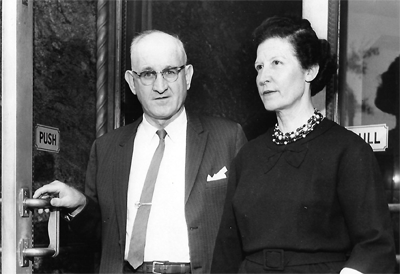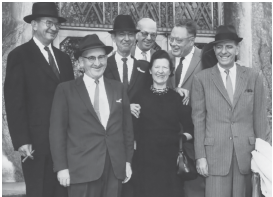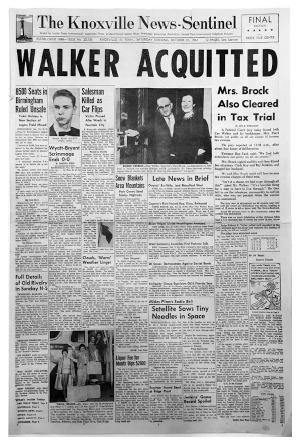The courtroom in the historic U.S. Post Office and Courthouse on Main Street in Knoxville (now the Tennessee Supreme Court Building) was the site of many major trials in its 64-year history of serving the U.S. District Court.
One of the most notable trials was that of millionaire supermarket owner and controversial Knoxville politician Cas Walker in 1961.

He was widely known and was said by some to have been in the local news more than any other individual in the past century. In addition to his business, he also had a local television show on which he advertised his groceries and hosted local country musicians. It was on his show that superstar Dolly Parton got her start.
The approximately 125 seats in the courtroom were filled every day of the three-week trial.
Some came because they wanted to see one of Knoxville's most famous lawyers in action -- the legendary Ray Jenkins.
Jenkins and another prominent Knoxville lawyer, Clyde Key, along with his associate, McAfee Lee, represented Walker. Some said Key's role was to try the case and that Jenkins' role was to appeal to the jury.
They were effective. Walker was acquitted, as was his co-defendant, Mrs. Pearl Brock, the company's office manager. The defendants and the lawyers are now deceased.
One morning before court convened on a day near the end of the trial, the jury was heard singing "The Old Rugged Cross" in the jury room. Several of the jurors were known to be singers, and one had brought his guitar.

I was a News Sentinel reporter at the time and interviewed a juror immediately after the trial. He said the jury felt that something strange was going on in Walker's operations but that the government failed to prove any wrongdoing.
Walker was known to talk at great length in all of his activities, often not staying on point. Despite the efforts of his lawyers and U.S. District Judge Robert L. Taylor to keep Walker's testimony on track, his answers often went far beyond the scope of the questions asked him. Sometimes, he even rambled on into little speeches.
But it was his talking during a recess that nearly got him in trouble with the judge. During a break, Walker strolled into the witness room and started talking to witnesses, which is disallowed by court rules.
Upon learning of the incident, Judge Taylor called the attorneys to the bench and told them, in a hushed, but stern, voice, "If he doesn't stop it, I'm going to take action. I expect you to see that it's stopped."

On his television show one evening during the course of the trial, when Walker started talking about what went on at the trial that day, the audio on the show was cut off the air for about two minutes. You could see him but you couldn't hear him.
WATE-TV said at the time that Walker's air time had been purchased only for the purpose of selling groceries and to offer entertainment by country musicians.
In the case against Walker, the government charged that, as part of the alleged tax fraud scheme, the supermarket chain regularly issued checks made out to various produce firms, and that an official of the grocery chain would then forge the firms' names on the back as endorsements, take from the daily proceeds a sum equal to the total, and use the money in the chain's produce operations.
The government said this mysterious process was Cas Walker Cash Stores' method of replenishing its produce fund.
"Why were these phony checks made out?" a government prosecutor asked Odell Cas Lane, Walker's nephew, who handled the grocery chain's produce operations.
Lane, a member of the Tennessee Legislature at the time, replied, "Those checks aren't phony. Just the names on them is, but that's all."
A few weeks after the trial ended, one of the jurors, and reportedly a second one, were hired as clerks in one of Walker's supermarkets. The grocery chain ceased operating in the mid-1980s.